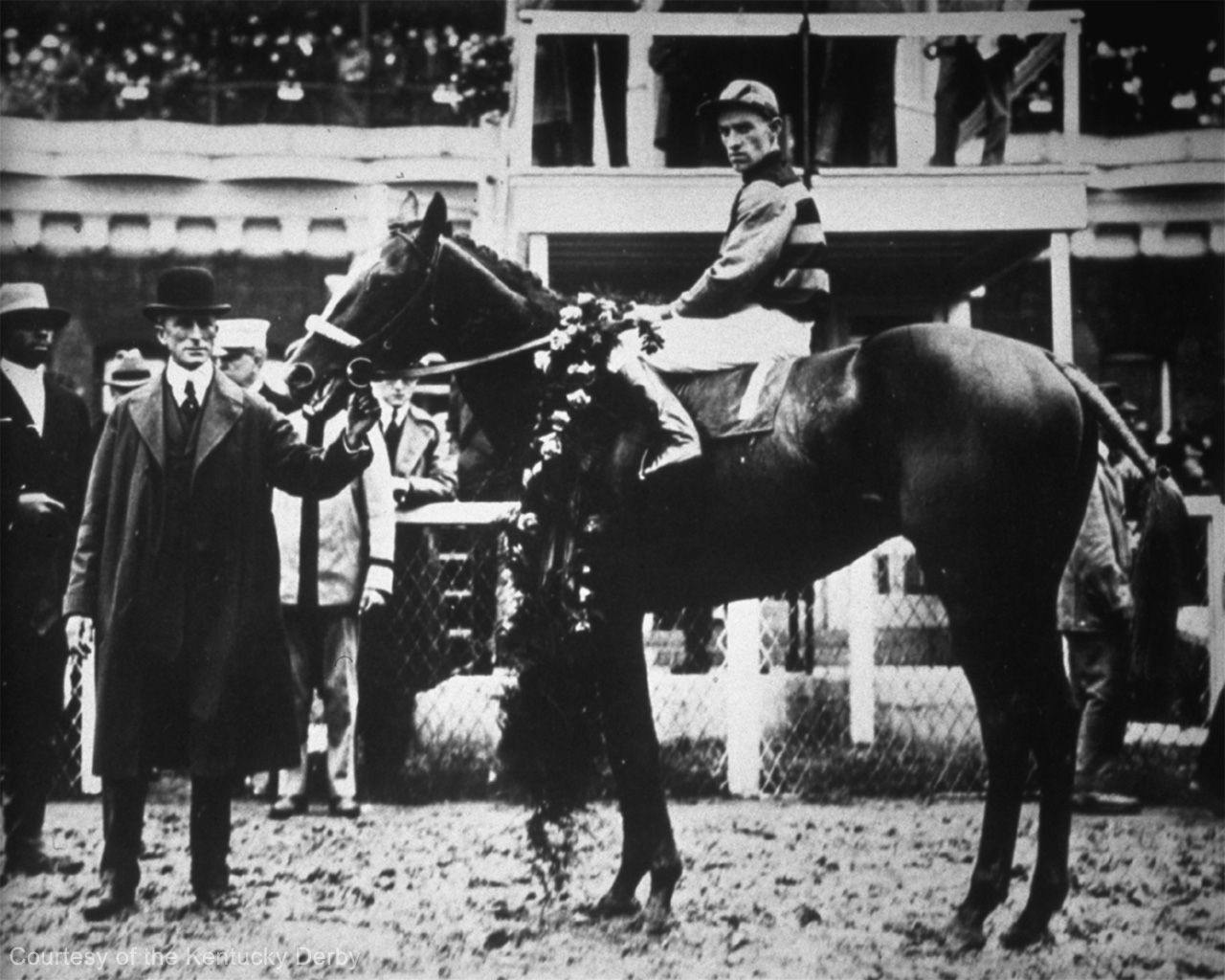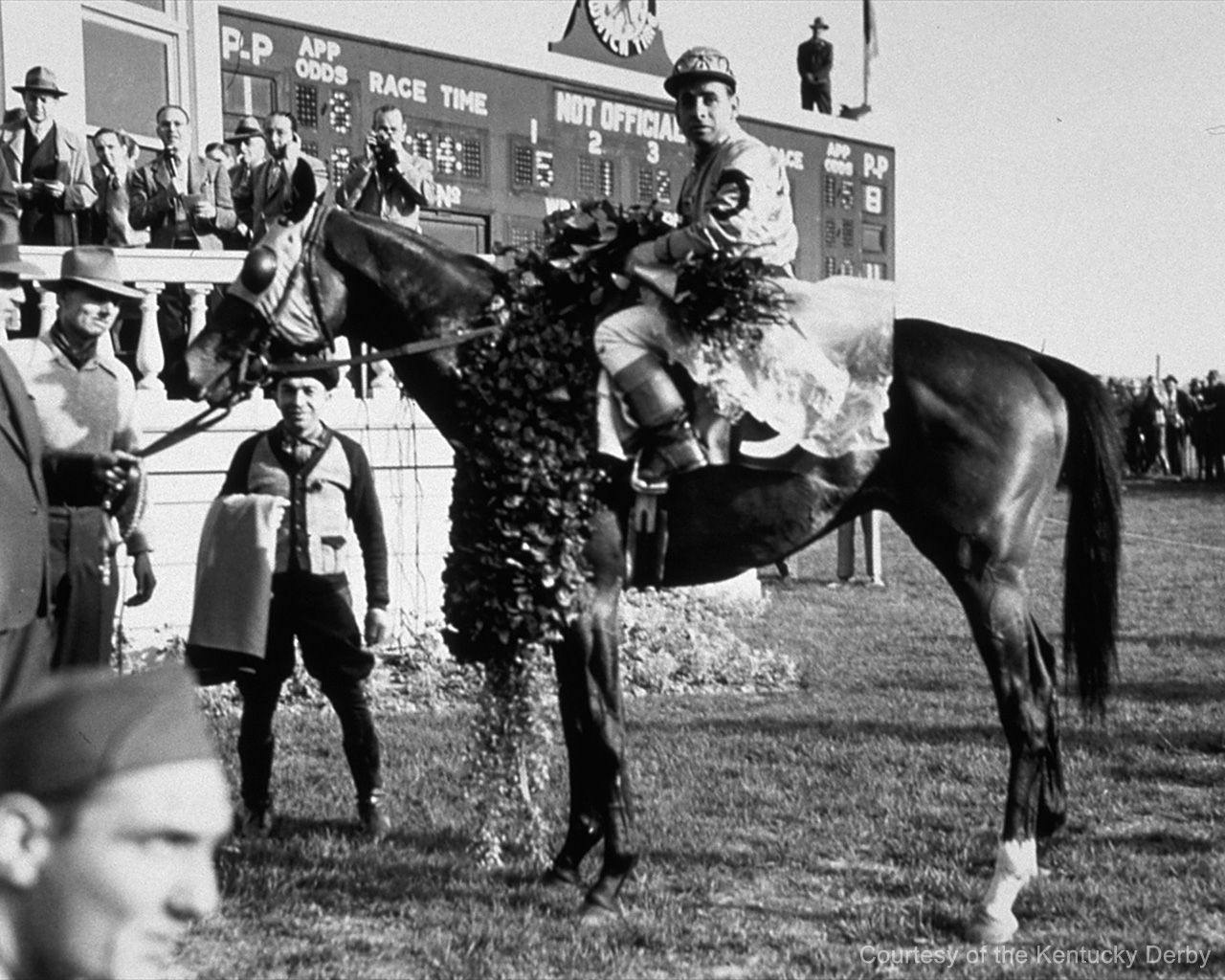Triple Crown Champions: Pros and cons in the virtual Kentucky Derby

Sir Barton wins the 1919 Kentucky Derby (Courtesy of the Kentucky Derby/Churchill Downs)
A virtual battle between 13 Triple Crown winners is unexplored territory. They may have been the undisputed best of their time, but how will they fare in this multigenerational showdown of champions?
In advance of Saturday’s widely-anticipated virtual Kentucky Derby, let’s review every Triple Crown winner and chart the pros and cons offered by their race records and running styles:
Sir Barton (1919)

Sir Barton 1919 Kentucky Derby (Courtesy of the Kentucky Derby/Churchill Downs)
Pros: A pure speedster, Sir Barton was dominant in all three of his classic victories and figures to be involved from the outset in the virtual Kentucky Derby, meaning he won’t have to worry about working out a clean trip.
Cons: With so many other front-running types in this battle of Triple Crown winners, Sir Barton won’t be able to relax on the front end.
Gallant Fox (1930)

Gallant Fox 1930 Kentucky Derby (Courtesy of the Kentucky Derby/Churchill Downs)
Pros: Versatility was Gallant Fox’s defining trait—he could win on the lead or while rallying from off the pace, giving him plenty of options to secure an ideal trip in the virtual Kentucky Derby.
Cons: Racing over the tiring tracks of yesteryear made Gallant Fox one of the slower Triple Crown winners on paper, which could affect his chances in this computer simulation based heavily on historical data.
Omaha (1935)

Omaha 1935 Kentucky Derby (Courtesy of the Kentucky Derby/Churchill Downs)
Pros: Late-running son of Gallant Fox beat quality competition during his Triple Crown sweep and should receive an ideal pace setup in this battle of champions.
Cons: Like his sire, Omaha posted modest times during his classic victories and won just two other stakes races during his career, two factors that could hurt his chances in the simulation.
War Admiral (1937)

War Admiral 1937 Kentucky Derby. (Courtesy of the Kentucky Derby/Churchill Downs)
Pros: Among the best of his generation at ages two, three, and four, War Admiral won all three of the spring classics in front-running style, and his final times were fast for the era.
Cons: Showed a tendency to falter when dueling for the early lead, most notably when losing a fabled match race against fan-favorite Seabiscuit, and he’ll be facing at least half a dozen pace rivals in this battle of Triple Crown winners.
Whirlaway (1941)

Whirlaway 1941 Kentucky Derby (Courtesy of the Kentucky Derby/Churchill Downs)
Pros: A deep closer with a brilliant turn-of-foot (just check out his sensational last-to-first victory in the Preakness), Whirlaway should relish the expected fast pace of the virtual Kentucky Derby. A two-time Horse of the Year victorious in 32 of his 60 starts, Whirlaway remains one of the most decorated and accomplished Triple Crown champions.
Cons: As a one-dimensional late runner, working out a clean trip could be tricky for Whirlaway, who risks getting stopped in traffic while rallying through the pack.
Count Fleet (1943)

Count Fleet 1943 Kentucky Derby (Courtesy of the Kentucky Derby/Churchill Downs)
Pros: No horse finished within three lengths of Count Fleet during his 3-year-old season, suggesting he was never required to show his best. He won the Belmont Stakes by 25 lengths in record time, and his aggregate margin of victory in the spring classics (36 lengths) is tied with Secretariat for the most dominant in history.
Cons: Enjoyed cozy front-running trips while beating small fields in the Preakness and Belmont Stakes. He’ll face a much sterner pace test in the virtual Kentucky Derby.
Assault (1946)

Assault 1946 Kentucky Derby (Courtesy of the Kentucky Derby/Churchill Downs)
Pros: Won the Kentucky Derby by eight lengths (equaling a still-standing record set by Whirlaway) and enjoyed ongoing success against tough competition as an older horse.
Cons: Struggled to win the Preakness and posted slow times in all three classics, which could affect his chances of being favored by the computer simulation.
Citation (1948)

Citation 1948 Kentucky Derby (Courtesy of the Kentucky Derby/Churchill Downs)
Pros: One of the most accomplished Triple Crown winners, Citation won each spring classic by a minimum of 3 1/2 lengths and retired with an extraordinary record of 32 wins, 10 seconds, and 2 thirds from 45 starts, in the process becoming the first horse to win a million dollars in purse money. Among Triple Crown winners, only Whirlaway won as many races.
Cons: Lost some of his invincibility when returning from injury as an older runner, losing 11 of his final 15 starts, and it’s unclear how this might affect his interpretation in the simulation.
Secretariat (1973)

Secretariat 1973 Kentucky Derby (Courtesy of the Kentucky Derby/Churchill Downs)
Pros: Won the three classics by a combined 36 lengths, equaling the record set by Count Fleet, and his winning times for the Kentucky Derby (1:59 2/5), Preakness (1:53.00), and Belmont (2:24) remain the standard for each race.
Cons: Occasionally misfired during his 3-year-old campaign, losing three races at short prices, introducing an element of unpredictability into his otherwise sensational record.
Seattle Slew (1977)

Seattle Slew 1977 Kentucky Derby (Courtesy of the Kentucky Derby/Churchill Downs)
Pros: Survived intense pace battles to win the Kentucky Derby and Preakness, making him one of the most formidable front-runners in the virtual Kentucky Derby. He’s also the only Triple Crown winner to defeat another Triple Crown winner, finishing ahead of Affirmed in the 1978 Malboro Cup H. (G1) and Jockey Club Gold Cup (G1)
Cons: Among the Triple Crown winners who raced as older horses, Seattle Slew’s record was relatively light with just two Grade 1 wins to his credit.
Affirmed (1978)

Affirmed 1978 Kentucky Derby (Courtesy of the Kentucky Derby/Churchill Downs)
Pros: Showed tremendous resilience and a refuse-to-lose attitude when defeating future Hall of Famer Alydar in all three legs of the Triple Crown. His winning times in the Derby (2:01 1/5), Preakness (1:54 2/5), and Belmont (2:26 4/5) remain among the Top 12 fastest times for each race.
Cons: Though not a need-the-lead front-runner, Affirmed strongly preferred to race up on the pace, which could place him in a challenging position while facing so many other speed horses in this showdown of legends. He also lost two head-to-head meetings against fellow Triple Crown champion Seattle Slew.
American Pharoah (2015)
Pros: Defeated large fields in all three of his classic wins and won the Belmont in 2:26.65, the second-fastest clocking among the Triple Crown winners.
Cons: Speedy colt worked surprisingly hard to win the Derby in a modest time and won’t escape with any easy lead in the virtual Kentucky Derby.
Justify (2018)
Pros: Defeated more rivals in his sweep of the spring classics than any other Triple Crown winner, proving he can handle deep fields and challenging competition. With his 6-for-6 record, Justify was also the only Triple Crown winner to retire undefeated.
Cons: Justify didn’t run especially fast in any of his classic victories, and as a front-runner he’ll have to deal with intense pace pressure in this matchup of legends.

Download the free Meet the Triple Crown winners PDF!
ADVERTISEMENT



